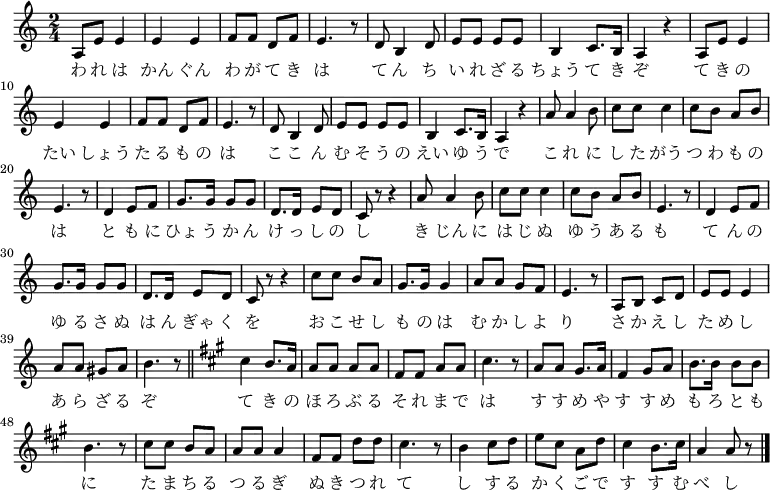Battōtai (song)
"Battōtai" (抜刀隊, Drawn-Sword Regiment) is a Japanese gunka composed by Charles Leroux with lyrics by Toyama Masakazu in 1885. Upon the request of the Japanese government, Leroux adapted it along with another gunka, "Fusōka" (Song of Fusang), into the military march Rikugun bunretsu kōshinkyoku in 1912.
| Lyrics | Toyama Masakazu |
|---|---|
| Music | Charles Leroux |
| Published | 1885 |
| Audio sample | |
Recording made on August 8, 1939 by the Imperial Japanese Army Band conducted by Ōnuma Satoru. The B and C sections of the march use the "Battōtai" melody.
| |
Background
The song references the Battōtai who fought in the Battle of Tabaruzaka during the 1877 Satsuma Rebellion. Because of supply problems and heavy rains, the Satsuma rebels were forced to engage with the Imperial Japanese Army in hand-to-hand combat. They inflicted heavy casualties against Imperial forces, who were mostly conscripts with no experience in wielding swords. Lieutenant General Yamagata Aritomo selected and deployed men from the surrounding area who were proficient with swords. He named this unit Battōtai or "Drawn-Sword regiment."[1]
Composition
Charles Leroux, a bandmaster and composer born in Paris, arrived in Japan in 1884 as part of a French military advisory group. He composed his "Battōtai" in 1885, while serving as bandmaster of the Imperial Japanese Army Band. The song was first publicly performed the same year at a concert hosted by the Greater Japan Music Society at the Rokumeikan. It was considered the first Western-style military song in Japan and the first to become popular across the country, although it was initially believed to be difficult to sing for Japanese unaccustomed to modulation.[2]
Lyrics
Battōtai is included in the first volume of poetry compilation Shintai Shishiyou, thanks to the common effort of Tokyo University's professors Masakazu Toyama, Ryoji Yatabe, and Tetsujirō Inoue, 17 years into Meiji's rule, in 1885; the poem posted below was contained in said compilation.
| Japanese[3] | Transliteration into rōmaji | English Translation |
|---|---|---|
我は官軍我敵は |
Ware wa kangun waga teki wa |
We are the imperial army and Our enemies are |
Foreign-language versions
One of the most famous Japanese patriotic songs, aside from the original in Japanese, Battotai has been sung in several languages including Filipino,[4] Indonesian,[5] Hindi,[6] Punjabi,[7] German,[8] English,[9] Spanish,[10] Polish,[11] and Latvian.[12]
Score

References
- Kotō, Masayoshi (1987). 西南戦争警視隊戦記 (in Japanese). 産経新聞データシステム. pp. 221–222.
- Kurata, Yoshihiro. 民衆歌謡:近世末期から近代への流れ. 岩波講座 日本の音楽・アジアの音楽 (in Japanese). Tokyo: 東京書籍. pp. 153–159. ISBN 4000103628.
- "新体詩抄. 初編 - 国立国会図書館デジタルコレクション".
- "Sing with DK - Battotai (Filipino Version) - Sundalo ng Republika". YouTube.
- "Battotai Bahasa Indonesia (Resimen Pedang)]". YouTube.
- ""बट्टोताई" 《Battotai in Hindi》". YouTube.
- ""ਬਤੋਤਾਈ" 《Battotai in Punjabi》". YouTube.
- "Sing with Karl - Battotai [Extended German Version][+ English Translation]". YouTube.
- "Battotai (English Version)". YouTube.
- "抜刀隊 (Battotai) - Imperial Japanese March [Spanish Version]". YouTube.
- "Battotai po polsku". YouTube.
- "Battotai [Rare Latvian Version] - Imperial Japanese Army March". YouTube.